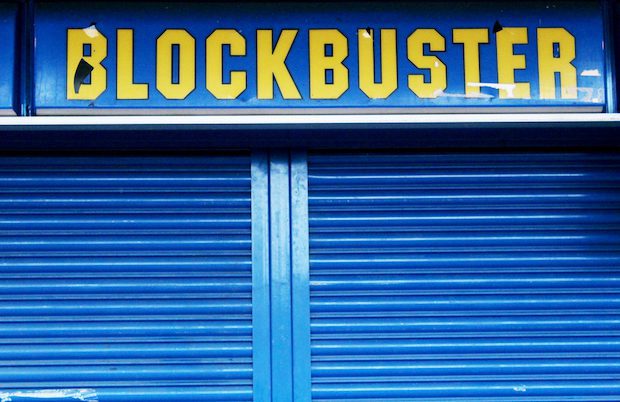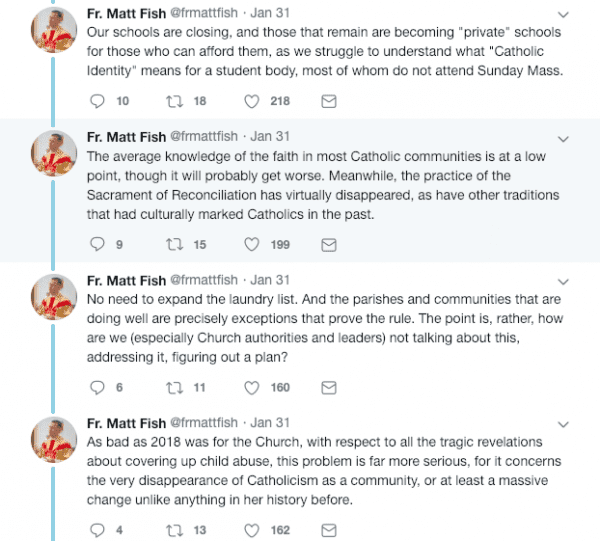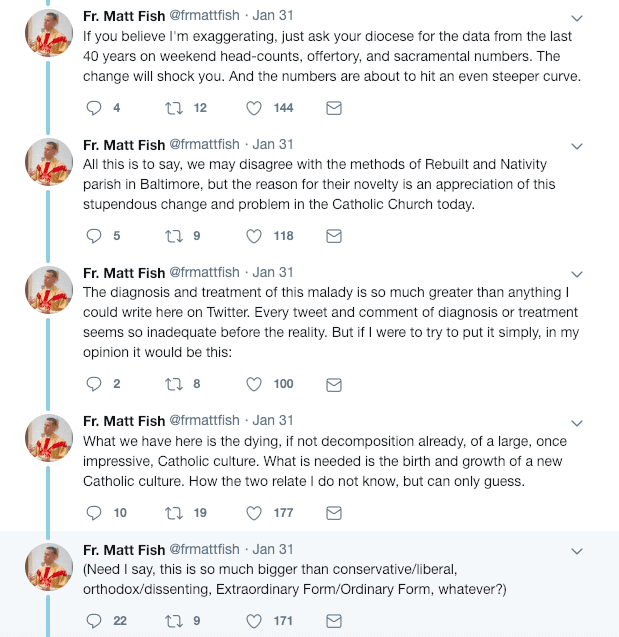The Future Of St. Blockbuster’s Parish

A Catholic reader e-mails about yesterday’s post on the molester priest from my childhood (which disappeared for a couple of hours earlier today, due to what I think was my editing error — it should be fixed now):
We’re dealing with a couple thousand of these guys, right? In addition to dozens (at minimum) of bishops who slime-lined them from post to post to cover the offenders’ tracks and their own tails. Just once, I would like to hear one of these guys say: “I sinned. I harmed the Church, the priesthood, and persons entrusted to my care, all of which are — because of me — damaged in their ability to attain their spiritual ends. In reparation for my sins I will spend the rest of my life doing penance, working as a laborer in a fishing village in the Dominican Republic. May God have mercy on my soul.”
Doesn’t happen, does it? The moral nerve has been killed. The “best” are capable only of a few clichés of lame remorse, and retire to a life of watching daytime television.
The abuser’s lawyers (and sometimes their religious superiors) try to mitigate blame by pointing to the good they accomplished. But this “good” was used tactically as a way of diverting suspicion and enlarging opportunities for predation.
The February “summit,” of course, is simply a stalling tactic buying Francis more time to put off confronting the Viganò claims head-on. Things might have gone out of his control at the U.S. bishops meeting in November, had anyone asked out loud who it was that McCarrick and Cupich promoted or knee-capped. The ruse of focusing “on the victims” pings all the right sentimentalisms (“it’s about the children!”) while deflecting attention from the explosive issue of the bishops, including the Pope, caught in a web of blackmail and bribery and — through cowardice and careerism — guilty of catastrophically harmful decisions. The current attempts to “lower expectations” are transparently self-serving (pro tip: to lower expectations accorded an international summit, don’t freeze the deliberations of national assemblies leading up to it).
In short, your childhood acquaintance’s damaged life is part of the price we must cheerfully pay to keep a Nighty-Night Tobin episcopacy in the saddle. It is churlish of the young man to resent the sacrifice.
Take those remarks in context of this thread by a young Catholic parish priest in the Archdiocese of Washington, DC:




You would do well to follow Father Fish on Twitter.
All of this reminds me of what a Catholic priest told me back in 2002, when the abuse scandal broke big: that it cannot be understood apart from the broader crisis within modern Catholicism. I’ve been reading an early copy of Prof. Stephen Bullivant’s forthcoming (May) book Mass Exodus, which examines the decline in Catholic belief and practice in the UK and US since Vatican II. Every bishop, priest, and Catholic lay leader should study this stunning book like it’s something close to Scripture. It’s a fairly exhaustive study of sociological data from the past 50 years. The idea is to answer the question: did the Second Vatican Council fail?
Bullivant’s answer is a qualified yes. The qualification is that massive social changes across the West have similarly hurt all Christian churches. If the Council had not happened, the Catholic Church would not have escaped these trends. That said, Catholics went to church in far higher numbers than Protestants did prior to the Council, which ran from 1962 to 1965. Their fall was more dramatic. Besides, the Council’s explicit aim was to equip Catholics to be faithful in the modern world. The ongoing collapse of Catholicism — some of which is causally related to Vatican II, Bullivant shows — is a clear sign that the Council failed.
I will be writing more about the book as we get closer to its release from Oxford University Press in May. This may be the most important book of interpretive religious sociology since Putnam and Campbell’s acclaimed American Grace in 2010. It’s important to say here, though, that Bullivant, himself a practicing Catholic, does not advise what the Church ought to do to stop the bleeding, much less reverse its losses. He says that is for another book. But there will be no way for the Church to turn things around unless it understands how it got into this existential crisis in the West — both how general cultural changes undermined Catholicism, and how the Church’s own actions over the past 50 years undermined itself. This is why Mass Exodus is so important.
I bring it up to underscore the social science strongly backing up what Father Fish is saying. I try to talk about this when I give speeches based on The Benedict Option to Catholic audiences. The collapse of Catholic life is profound, and the faithful laity cannot expect the bishops or the institution to be of much help at all. A recent Gallup poll found that a record low of 31 percent of US Catholics rated the honesty of the clergy as “high” or “very high.” Gallup also found that only 44 percent of US Catholics said they had confidence in the institution. If there is going to be a Catholic Church in the West to any meaningful degree, it will have to depend on small networks of faithful families, orthodox priests, and orthodox religious (that is, monks and nuns), all of whom know their faith and practice it concretely.
(Of course all Christians in the West are facing this; there is no escape, though how Protestants and Orthodox Christians deal with it within their own communions will differ.)
Father Fish is right: we are talking about the disappearance of Catholic communities, within the lifetime of many of us. Nobody wants to hear it, but it’s true. The Catholic bishops — including the Pope — are so fixated on avoiding real accountability for the privileged sex racket that they’ve run, preying on the children of the faithful, for so long that they cannot begin to address the deeper crisis.
I mentioned here the cab driver who took me from my Dublin hotel to the airport. He was in his 60s, I’d say, and talked with anger in his voice about how neither he nor anybody in his family goes to mass anymore. He said that most of his friends don’t either. “Them days is over,” he said. In Ireland, the looks on the faces of many of the still-faithful I talked to reminded me of what it was like walking around Manhattan in the late autumn of 2001: a mask of shell-shock, as if nobody could quite believe what had happened to us on September 11.
In the US, Catholics have been spared the sharp shock that hit Ireland, but make no mistake: the decline is here too, though its slower, and because there are so many Catholics in America, it’s not as obvious as it is to Irish Catholics.
Over the next two decades, the reality of this crisis will be undeniable. The “lowered expectations” of Pope Francis’s kick-the-can-down-the-road strategy are only going to accelerate the decline because they will once again demonstrate the unseriousness of the Catholic Church’s leadership class. This year — 2019 — half of all Catholic priests in America will reach the minimum retirement age of 70. If you are a Catholic, and you are not preparing yourself and your family now for life in the desert, you are wasting precious time. The future of all Christians in post-Christian America is going to be more or less monastic, if it’s going to be at all.
So: what’s going on in St. Blockbuster’s Parish near you? Talk to me.
UPDATE: Brother Neil comments:
When I talk to family and friends about the sex-abuse scandals in the Church, I try to explain, the corruption is is so much more wide-spread and deep than is understood by outsiders, or acknowledged by insiders. The Catholic Church has been decaying and disintegrating for the past century, and the rot has infected so many areas of the Church: Morals, virtue, practice, theology, liturgy, scripture, politics, so much. Clerics are obsessed with ‘progress’; “we can’t look back with nostalgia , we can only go forward!”. Forward toward what? More decay and disintegration?
As a member of a religious order, I can say many publicly vowed Catholic religious do not pray the Liturgy of the Hours; they will even fight at house meetings to prevent the community from gathering for prayer. They disparage the vows of poverty, chastity and obedience; one member in leadership told me, “The vows don’t work”. What the hell is the point of consecrated life if it isn’t the Evangelical Councils? And we profess these vows publicly!
I was talking with a non-Catholic friend recently about the a popular misconception about sexually abusive priests: They are repressed by the rigid morality of the Catholic Church (vow of chastity) and act out (molest children). I told him: many, many Catholic priests do not believe in the Catholic faith, much less in the magisterial teachings on morality. They do not practice them, and they do not preach them. Moreover, if you believe in Catholic doctrine on faith and morals you will get bullied, and if you have too much zeal for the Catholic faith, this is a “red flag”.
Honestly, I believe bad news for the Church is good news for the Church. I delight in all of these States’ Attorneys prosecuting the Church. I want the demographic collapse to happen; sooner rather than later. Some deadly thing has fastened upon the Church, and many clerics desperately cling to it also; the only way to separate from it may be for the Church to be brought into critical condition.
This wicked generation sought a sign, but the only sign that will be given them is the Sign of Jonah: Repent or be Destroyed. I pray, and pray that we may repent and believe in the Gospel.